(完整版)初中英语一般将来时专项语法讲解
(完整版)初中一般将来时讲解

(完整版)初中一般将来时讲解初中一般将来时是英语中表达将来时间的一种时态,它用来表示将来某个时间将要发生的动作、事件或情况。
本文将对初中一般将来时进行详细讲解。
一、构成初中一般将来时的构成主要由以下几个部分组成:1. 助动词“will”,用于表示将来。
2. 动词的原形(即不带to的动词原型)。
二、用法初中一般将来时主要有以下几种用法:1. 表示将来的计划或意图。
例如:- I will study harder in order to pass the exam. - They will go on a trip next week.2. 表示预测或推测。
例如:- It will rain tomorrow.- The team will win the game.3. 表示承诺或意愿。
例如:- I will help you with your homework.- We will support you all the way.4. 表示意愿或请求。
例如:- Will you please open the window?- I will go shopping if you want.三、注意事项在初中一般将来时的使用中,需要注意以下几点:1. 助动词“will”后面直接接动词的原形,不带任何变化。
2. 否定句在助动词“will”后面加上“not”构成,缩写形式为“won't”。
3. 疑问句将助动词“will”提到句子的主语之前。
四、例句以下是一些初中一般将来时的例句:1. I will travel to Japan next year.3. Will you go to the beach tomorrow?五、总结初中一般将来时是英语中一种表示将来时间的时态。
在使用时,需要注意助动词“will”的使用以及动词的原形。
它可以用于表示计划、预测、承诺等。
希望本文能够对您的学习有所帮助。
中考英语一般将来时和过去将来时专项讲解
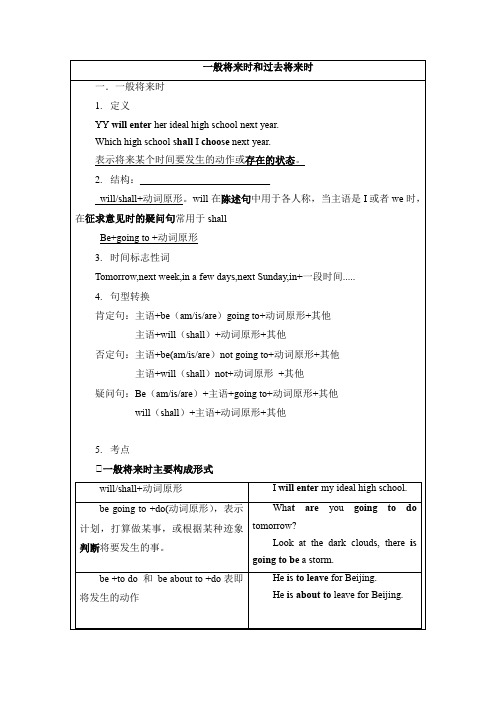
一般将来时和过去将来时一.一般将来时1.定义YY will enter her ideal high school next year.Which high school shall I choose next year.表示将来某个时间要发生的动作或存在的状态。
2.结构:__________________________will/shall+动词原形。
will在陈述句中用于各人称,当主语是I或者we时,在征求意见时的疑问句常用于shallBe+going to +动词原形3.时间标志性词Tomorrow,next week,in a few days,next Sunday,in+一段时间.....4.句型转换肯定句:主语+be(am/is/are)going to+动词原形+其他主语+will(shall)+动词原形+其他否定句:主语+be(am/is/are)not going to+动词原形+其他主语+will(shall)not+动词原形+其他疑问句:Be(am/is/are)+主语+going to+动词原形+其他will(shall)+主语+动词原形+其他5.考点①一般将来时主要构成形式will/shall+动词原形I will enter my ideal high school.be going to +do(动词原形),表示计划,打算做某事,或根据某种迹象判断将要发生的事。
Wha t are you going to do tomorrow?Look at the dark clouds, there is going to be a storm.be +to do 和be about to +do表即将发生的动作He is to leave for Beijing.He is about to leave for Beijing.He is leaving for Beijing.Be+doing表将来(come,go,leave,start等瞬间动词)翻一翻我将会待在这个漂亮的城市。
初二英语语法分析--一般将来时用法讲解
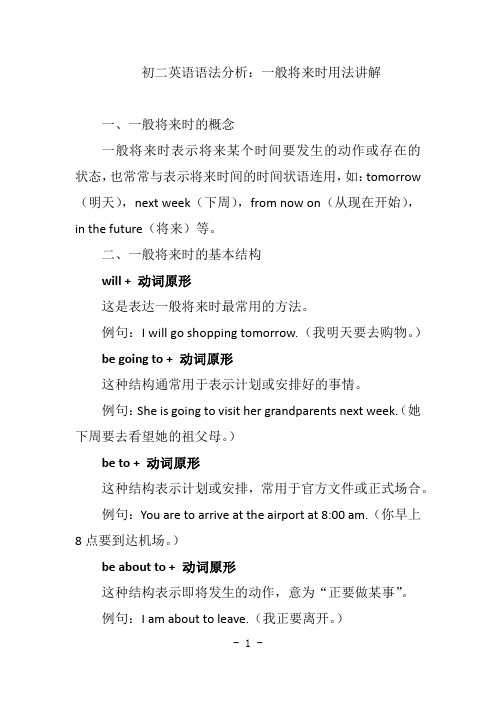
初二英语语法分析:一般将来时用法讲解一、一般将来时的概念一般将来时表示将来某个时间要发生的动作或存在的状态,也常常与表示将来时间的时间状语连用,如:tomorrow (明天),next week(下周),from now on(从现在开始),in the future(将来)等。
二、一般将来时的基本结构will + 动词原形这是表达一般将来时最常用的方法。
例句:I will go shopping tomorrow.(我明天要去购物。
)be going to + 动词原形这种结构通常用于表示计划或安排好的事情。
例句:She is going to visit her grandparents next week.(她下周要去看望她的祖父母。
)be to + 动词原形这种结构表示计划或安排,常用于官方文件或正式场合。
例句:You are to arrive at the airport at 8:00 am.(你早上8点要到达机场。
)be about to + 动词原形这种结构表示即将发生的动作,意为“正要做某事”。
例句:I am about to leave.(我正要离开。
)be due to + 动词原形这种结构表示某事预定或预期将要发生。
例句:The train is due to arrive at 5:00 pm.(火车预定下午5点到达。
)三、一般将来时的用法1表示将来的动作或状态例句:I will buy a new car next year.(明年我要买一辆新车。
)2表示将来的计划或安排例句:We are going to have a picnic this weekend.(我们这个周末要去野餐。
)3表示根据现有情况推测未来的可能性例句:It's going to rain soon.(很快就要下雨了。
)4表示命令、请求、建议等例句:You are to finish your homework before you go out.(你出去之前要把作业做完。
(完整版)初中一般将来时讲解.docx
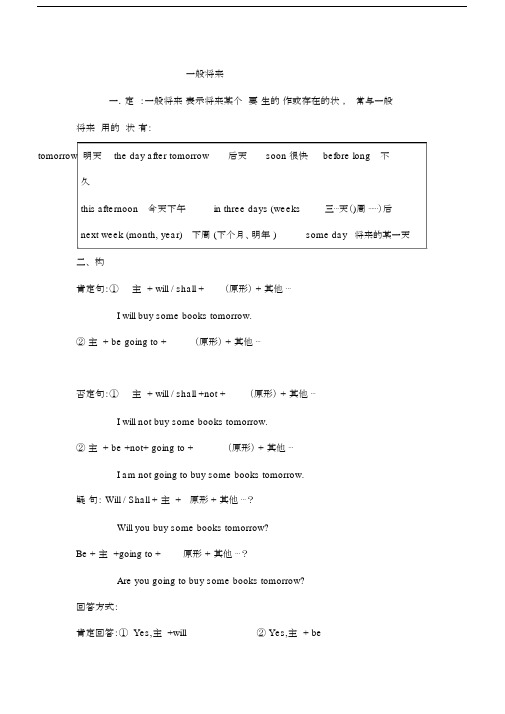
一般将来一.定:一般将来表示将来某个要生的作或存在的状,常与一般将来用的状有:tomorrow 明天the day after tomorrow后天soon 很快before long不久this afternoon今天下午in three days (weeks三⋯天()周⋯⋯)后next week (month, year)下周(下个月、明年)some day将来的某一天二、构肯定句:①主+ will / shall +(原形)+其他⋯I will buy some books tomorrow.②主 + be going to +(原形)+其他⋯否定句:①主+ will / shall +not +(原形)+其他⋯I will not buy some books tomorrow.②主 + be +not+ going to +(原形)+其他⋯I am not going to buy some books tomorrow.疑句: Will / Shall + 主 + 原形 + 其他⋯?Will you buy some books tomorrow?Be + 主 +going to +原形+其他⋯?Are you going to buy some books tomorrow?回答方式:肯定回答:① Yes,主 +will② Yes,主+ be否定回答:① No, 主 +will +not② No,主+be + not特殊疑句:特殊疑+shall /will+主+原型+其他⋯Where will you go next week?下星期你去哪?What shall I do? 我怎么呢 ?How many books will they get?他将有多少本?三区.will, be going to⋯, be to(高⋯中), be about to(初中)⋯1.be going to + 不定式,表示将来。
(完整版)初中英语语法一般将来时态

与一般将来时连用的时间状语
tomorrow 明天 the day after tomorrow 后天 soon 很快
this year 今年 next week 下周 in the future 将来
in three days 三天后
in ten minutes 在一般将来时 中用IN 表示在多久以后
What are they going to do this evening? They are going to watch TV.
What is the bear going to do tomorrow?
It is going to cook dinner.
What are they going to do ?
There will be only one country. 否定句:在will后面加not.
There won’t be only one country. 一般疑问句:把will提到there之前。
Will there be only one country? Yes, there will. / No, there won’t.
一般将来时的主要用法:
1、表示将来某一时刻的动作或状态: We will come to see you the day after tomorrow. There will be a wonderful show next week.
2、表示将来某一段时间内经常的动作或状态: The students will come and work in the lab once a
They will do heavy work.
They won`t do Will they do heavy work. heavy work?
一般将来时(8张PPT)初中英语专项复习课件

肯定句:主语+ will +do+其他 People will have robots in their homes. 否定句:主语+ will not /won't+do+其他 People will not/won’t have robots in their 一般疑问句:Will+主语+do+其他? 肯定回答:Yes, they will. 否定回答:No, they won’t. Will people have robots in their homes?
homes.
2.而be going to +do通常用来谈论在一个较近的未来将要发生的计 划中的或是有可能发生的事。如:
I am going to visit us next month.(在一个较近的未来将要发生 的计划中的事)
It is so cloudy. I think it’s going to rain. (有可能发生的事)
一般将来时
初中英语专项复习
一、一般将来时的意义: 用来描述一个即将要发生的动作;谈论未来的计划和打算。
二、一般将来时的基本结构: will/shall+动词原形
be going to+动词原形
常见时间状语:
next Tuesday next week the coming Sunday next year this afternoon
tomorrow tonight in a few minutes in the future in five years
三、一般将来时
1.will 用于一切人称,shall只用于第一人称(I/we)。但现代英语倾向 于所有人称都使用will而不用shall。will/shall + do通常用来谈论未 来会发生的事或是正在制定的计划。 It will rain this afternoon.(未来发生) I will take an umbrella with me.(计划)
语法讲解一般将来时

be doing结构表示将来时间
表示按计划安排即将发生的动作
The train is leaving at 5 o'clock.
表示根据时间表或日程安排即将发生的动作
The plane is taking off in 10 minutes.
表示按计划或约定即将发生的动作
We are meeting at the restaurant at 7 tonight.
go D. will, do, go
选择题练习
答案:D
解析:根据时间状语this weekend,第一空应使用将来时态;第二空是be doing表 示将来;第三空表示个人意愿,应使用一般现在时态。
翻译练习
我将在下个月去旅行。 答案:will go
I _____ _____ on a trip next month.
1 2
表示意愿或承诺做某事
I will help you with your project if you need me.
表示临时决定做某事
I will go to the store later, I don't have any milk left.
3
表示假设条件下的将来行动
If you don't mind, I will stay for dinner.
语法讲解一般将来时
目录
• 引言 • 一般将来时的定义和构成 • 一般将来时的基本用法 • 一般将来时的特殊用法 • 一般将来时的否定句和疑问句形式 • 练习和巩固
01
引言
主题简介
一般将来时是英语语法中的一种时态,用于描述将来发 生的事件或动作。
它通常由助动词will或shall后接动词原形构成,表示未 来的行为或状态。
完整)初中一般将来时讲解
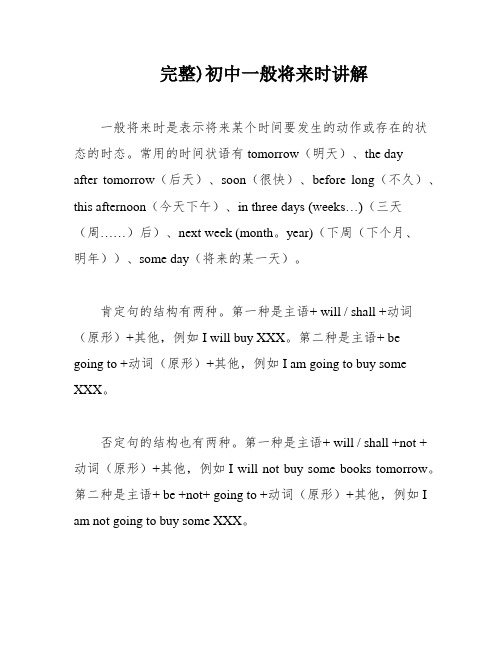
完整)初中一般将来时讲解一般将来时是表示将来某个时间要发生的动作或存在的状态的时态。
常用的时间状语有tomorrow(明天)、the dayafter tomorrow(后天)、soon(很快)、before long(不久)、this afternoon(今天下午)、in three days (weeks…)(三天(周……)后)、next week (month。
year)(下周(下个月、明年))、some day(将来的某一天)。
肯定句的结构有两种。
第一种是主语+ will / shall +动词(原形)+其他,例如I will buy XXX。
第二种是主语+ be going to +动词(原形)+其他,例如I am going to buy some XXX。
否定句的结构也有两种。
第一种是主语+ will / shall +not +动词(原形)+其他,例如I will not buy some books tomorrow。
第二种是主语+ be +not+ going to +动词(原形)+其他,例如I am not going to buy some XXX。
疑问句的结构也很简单。
第一种是Will / Shall +主语+动词原形+其他…?例如XXX?第二种是Be +主语+going to +动词原形+其他…?例如Are you going to buy some books tomorrow?肯定回答有两种方式。
第一种是Yes,主语+will,例如Yes。
I will。
第二种是Yes,主语+ be,例如Yes。
I am。
否定回答也有两种方式。
第一种是No,主语+will +not,例如No。
I will not。
第二种是No,主语+be + not,例如No。
I am not。
除了一般将来时,还有其他表示将来的时态,如be going to、be to(高中)、be about to(初中)。
完整版初中英语一般将来时专项语法讲解
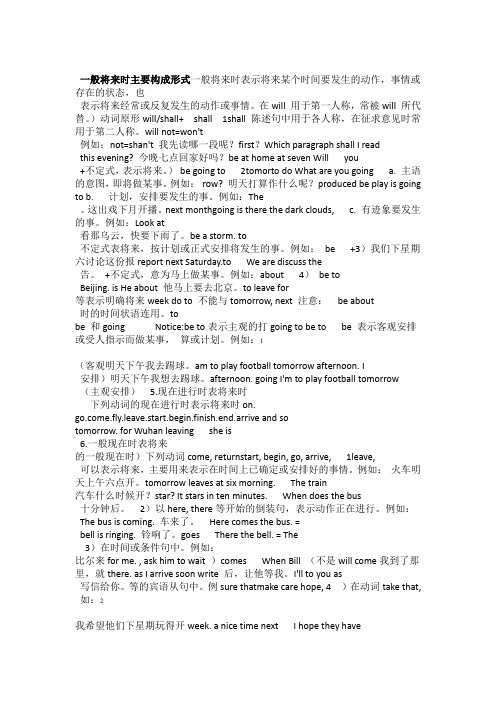
一般将来时主要构成形式一般将来时表示将来某个时间要发生的动作,事情或存在的状态,也表示将来经常或反复发生的动作或事情。
在will 用于第一人称,常被will 所代替。
)动词原形will/shall+shall1shall 陈述句中用于各人称,在征求意见时常用于第二人称。
will not=won't例如:not=shan't 我先读哪一段呢?first?Which paragraph shall I readthis evening? 今晚七点回家好吗?be at home at seven Will you+不定式,表示将来。
)be going to 2tomorto do What are you going a. 主语的意图,即将做某事。
例如:row? 明天打算作什么呢?produced be play is going to b. 计划,安排要发生的事。
例如:The。
这出戏下月开播。
next monthgoing is there the dark clouds, c. 有迹象要发生的事。
例如:Look at看那乌云,快要下雨了。
be a storm. to不定式表将来,按计划或正式安排将发生的事。
例如:be +3)我们下星期六讨论这份报report next Saturday.to We are discuss the告。
+不定式,意为马上做某事。
例如:about 4)be toBeijing. is He about 他马上要去北京。
to leave for等表示明确将来week do to 不能与tomorrow, next 注意:be about时的时间状语连用。
tobe 和going Notice:be to表示主观的打going to be to be 表示客观安排或受人指示而做某事,算或计划。
例如:1(客观明天下午我去踢球。
am to play football tomorrow afternoon. I安排)明天下午我想去踢球。
完整)初中英语一般将来时
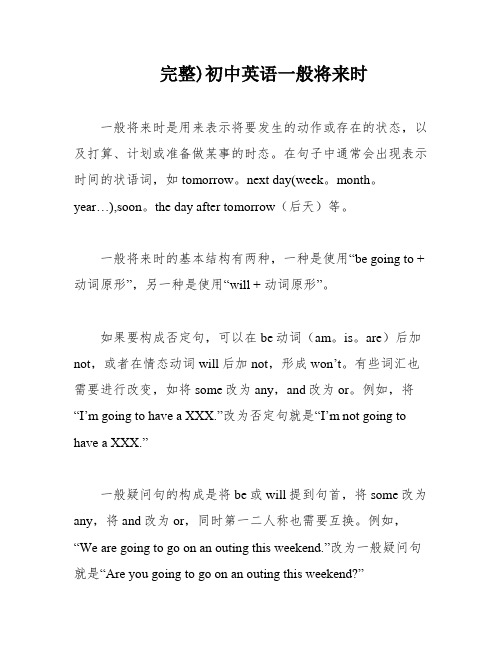
完整)初中英语一般将来时一般将来时是用来表示将要发生的动作或存在的状态,以及打算、计划或准备做某事的时态。
在句子中通常会出现表示时间的状语词,如tomorrow。
next day(week。
month。
year…),soon。
the day after tomorrow(后天)等。
一般将来时的基本结构有两种,一种是使用“be going to + 动词原形”,另一种是使用“will + 动词原形”。
如果要构成否定句,可以在be动词(am。
is。
are)后加not,或者在情态动词will后加not,形成won’t。
有些词汇也需要进行改变,如将some改为any,and改为or。
例如,将“I’m going to have a XXX.”改为否定句就是“I’m not going to have a XXX.”一般疑问句的构成是将be或will提到句首,将some改为any,将and改为or,同时第一二人称也需要互换。
例如,“We are going to go on an outing this weekend.”改为一般疑问句就是“Are you going to go on an outing this weekend?”对于划线部分的提问,一般将来时的对划线部分有三种情况。
第一种是问人,可以使用Who,例如“I’m going to New York soon.”改为问句就是“Who’s going to New York soon?”第二种是问干什么,可以使用What … do,例如“My father is going to watch a race with me this after noon.”改为问句就是“What is your father going to do with you this afternoon?”第三种是问什么时候,可以使用When,例如“She’s going to go to bed at nine.”改为问句就是“When is she going to bed?”同义句的构成是将be going to改为will,例如“I am going to go XXX.”可以改为“I will go XXX.”最基本的一般将来时结构是使用“will + 动词原形”,例如“XXX.”表示明天他们将要参观博物馆。
初中一般将来时讲义【含答案】
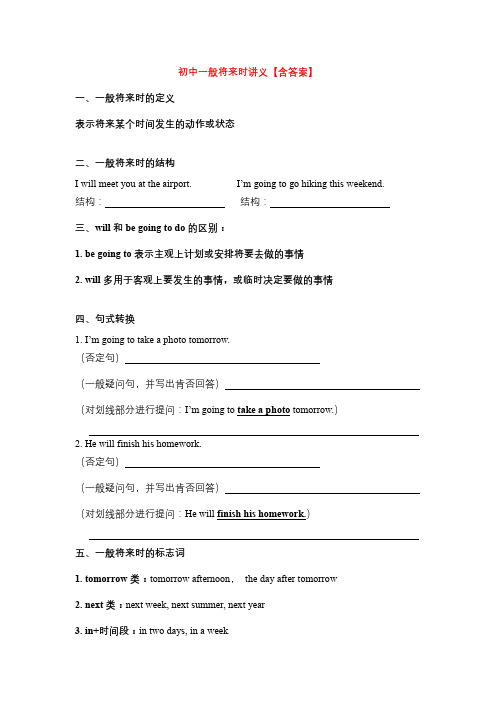
初中一般将来时讲义【含答案】一、一般将来时的定义表示将来某个时间发生的动作或状态二、一般将来时的结构I will meet you at the airport. I’m going to go hiking this weekend.结构:结构:三、will和be going to do的区别:1. be going to表示主观上计划或安排将要去做的事情2. will多用于客观上要发生的事情,或临时决定要做的事情四、句式转换1. I’m going to take a photo tomorrow.(否定句)(一般疑问句,并写出肯否回答)(对划线部分进行提问:I’m going to take a photo tomorrow.)2. He will finish his homework.(否定句)(一般疑问句,并写出肯否回答)(对划线部分进行提问:He will finish his homework.)五、一般将来时的标志词1. tomorrow类:tomorrow afternoon,the day after tomorrow2. next类:next week, next summer, next year3. in+时间段:in two days, in a week4.其他:in the future, one day, someday【课堂练习】1. We don’t know when __________ next week. Please call me when he arrives.A. will he arriveB. does he arriveC. he will arriveD. he arrives2. —How soon will he come back to Guangzhou?—I have no idea. Maybe he __________ in one or two days.A. will comeB. comesC. comeD. came3. ---will the train arrive?---It the station in 50 minutes.A. How soon; will get toB. How soon; arriveC. How long; will reachD. How far; gets to4. Will you at the bus stop at 10:30?A. meetingB. meetsC. meetD. met5. Lily and I to the concert it we free next week.A. go; areB. go; will beC. will go; will beD. will go; are初中一般将来时讲义(答案)一、一般将来时的定义表示将来某个时间发生的动作或状态二、一般将来时的结构I will meet you at the airport. I’m going to go hiking this weekend.结构:will+动词原形结构:am/is/are going to+动词原形三、will和be going to do的区别:1. be going to表示主观上计划或安排将要去做的事情2. will多用于客观上要发生的事情,或临时决定要做的事情四、句式转换1. I’m going to take a photo tomorrow.(否定句)I’m not going to take a photo tomorrow.(一般疑问句,并写出肯否回答)---Are you going to take a photo tomorrow?---Yes, I am. / No, I’m not.(对划线部分进行提问:I’m going to take a photo tomorrow.)What are you going to do tomorrow?2. He will finish his homework.(否定句)He will not finish his homework.(一般疑问句,并写出肯否回答)---Will he finish his homework?---Yes, he will. /No, he won’t.(对划线部分进行提问:He will finish his homework.)What will he do?五、一般将来时的标志词1. tomorrow类:tomorrow afternoon,the day after tomorrow2. next类:next week, next summer, next year3. in+时间段:in two days, in a week4.其他:in the future, one day, someday【课堂练习】1. We don’t know when __________ next week. Please call me when he arrives.A. will he arriveB. does he arriveC. he will arriveD. he arrives2. —How soon will he come back to Guangzhou?—I have no idea. Maybe he __________ in one or two days.A. will comeB. comesC. comeD. came3. ---will the train arrive?---It the station in 50 minutes.A. How soon; will get toB. How soon; arriveC. How long; will reachD. How far; gets to4. Will you at the bus stop at 10:30?A. meetingB. meetsC. meetD. met5. Lily and I to the concert it we free next week.A. go; areB. go; will beC. will go; will beD. will go; are。
初中英语一般将来时详细讲解

初中英语一般将来时讲解初中英语一般将来时(Simple Future Tense)用于表示将来某个时间会发生的动作或存在的状态。
下面是初中英语一般将来时的详细讲解:一、构成:1.一般将来时的肯定句结构为:主语 + will + 动词原形2.一般将来时的否定句结构为:主语 + will not (won't) + 动词原形3.一般将来时的疑问句结构为:Will + 主语 + 动词原形?二、用法:1. 表示未来的事实、计划或打算:①I will visit my grandparents next week.(我下周会去看望我的祖父母。
)②We will have a party on Saturday.(我们周六要开个派对。
)2. 表示预测或推测:①It will rain tomorrow.(明天会下雨。
)②He will probably be late for the meeting.(他可能会迟到会议。
)3. 表示意愿、请求、建议等:①Will you please help me with my homework?(你能帮我做作业吗?)②I will do my best to help you.(我会尽力帮助你。
)4. 表示承诺或威胁:①I will always love you.(我会永远爱你。
)②If you don't listen to me, I will tell the teacher.(如果你不听我的话,我会告诉老师。
)注意事项:1. 在一般将来时中,主语通常是第一人称(I/we)或第三人称(he/she/it/they),而第二人称(you)在肯定句和否定句中都是一样的。
2. 一般将来时的疑问句需要将助动词will放在句首。
3. 在一般将来时中,表示将来时间的副词或时间状语可以与will连用,如tomorrow, next week等。
三、总结:初中英语一般将来时用于表示未来某个时间会发生的动作或存在的状态,可以用于表达事实、计划、预测、意愿、请求等。
中考语法复习 一般将来时(附中考真题及解析)

中考语法复习一般将来时(附中考真题及解析)一、一般将来时1.概念:一般将来时表示将来某一时刻的动作或状态,或将来某一段时间内经常的动作或状态。
2.一般将来时的三种意义:预测(prediction):表示说话人认为将会发生某件事,即是表示猜测将来某事发生的可能性如:It will rain later.一会会下雨。
事先计划(future plan):表示说话人在头脑里已经决定好将来要做某件事如:My holiday is so long , and I am going to travel.意愿(willingness):表示说话人既不是预计某事将会发生,也不是预计经过考虑决定将做某事,而是在说话的时刻立即表明他将去做某事如:Someone is knocking at the door, I will go and open it.二、一般将来时结构一般将来时常常和表示将来的时间状语连用。
英式英语第一人称用shall,第二、三人称用will,而美式英语则不管什么人称,一律用will。
如:tomorrow(明天),next week(下周),from now on(从现在开始);in the future(将来)等。
⒈主语+ be going to do 表示主观的打算或计划。
⒉主语+ shall/will + do sth 其否定式shall not 和will not 的缩写式分别为shan't 和won't。
⒊ be 主语+ to do 表示客观安排或受人指示做某事或已安排好要在将来发生的事,是比较正式的用法。
如:They are to go on a strike on July 8.She is to be married next month.You are to finish your homework before you go to play.⒋主语+ be about to do,意为马上作某事,不能与tomorrow,next week 等表示明确将来时的时间状语连用,意思为“正要,马上就要”。
(完整版)一般将来时讲义

一般将来时1.一般将来时的基本概念一般将来时表示将来某一时刻的动作或状态,或将来某一段时间内经常的动作或状态。
一般将来时由助动词shall(第一人称),will(第二、三人称)+动词原形构成。
美国英语则不管什么人称,一律用will.2.一般将来时的形式●will 常简略为 'll,并与主语连写在一起,如:I’ll,he'll,it'll,we’ll,you'll,they’ll。
●一般疑问句如用will you…?其简略答语须是Yes,I will或 No,I will not;如用 Shall you…?(较少见)其简略答语须是 Yes,I shall.或 No, I shall not.。
3.一般将来时的用法1)表示将来的动作或状态一般将来时常与一些表示将来的时间状语连用,如:tomorrow(明天), next week(下周), from now on(从现在开始);in the future(将来)等.2)表示将来经常发生的动作。
4.一般将来时的其他用法一般将来时表示将来某一时刻的动作或状态,其表达形式除了“shall(第一人称),will(第二、三人称)+动词原形构成”外,还有以下几种形式.1)“to be going to+动词原形”表示即将发生的或最近打算进行的事.例如:①It is going to rain。
要下雨了。
②We are going to have a meeting today. 今天我们开会。
2)go, come,start,move,sail,leave,arrive,stay等可用进行时态表示按计划即将发生的动作,例如:I'm leaving for Beijing。
我要去北京.3)“be to+动词原形”表示按计划要发生的事或征求对方意见。
例如:①Are we to go on with this work?我们继续干吗?②The boy is to go to school tomorrow.这个男孩明天要去上学。
2024年中考英语一般将来时详解以及练习
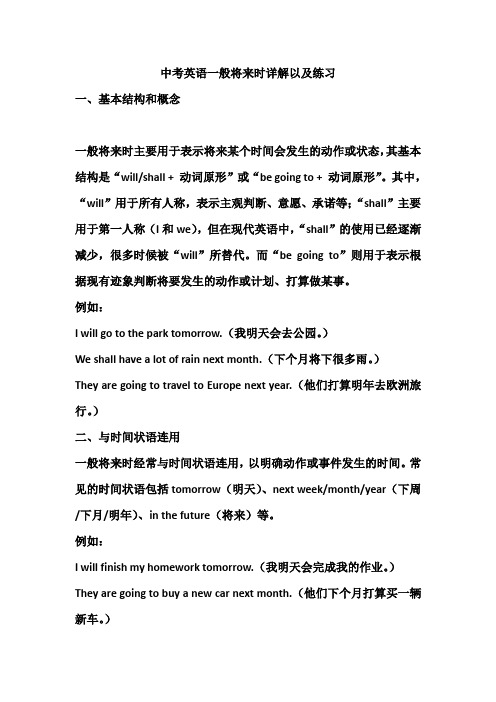
中考英语一般将来时详解以及练习一、基本结构和概念一般将来时主要用于表示将来某个时间会发生的动作或状态,其基本结构是“will/shall + 动词原形”或“be going to + 动词原形”。
其中,“will”用于所有人称,表示主观判断、意愿、承诺等;“shall”主要用于第一人称(I和we),但在现代英语中,“shall”的使用已经逐渐减少,很多时候被“will”所替代。
而“be going to”则用于表示根据现有迹象判断将要发生的动作或计划、打算做某事。
例如:I will go to the park tomorrow.(我明天会去公园。
)We shall have a lot of rain next month.(下个月将下很多雨。
)They are going to travel to Europe next year.(他们打算明年去欧洲旅行。
)二、与时间状语连用一般将来时经常与时间状语连用,以明确动作或事件发生的时间。
常见的时间状语包括tomorrow(明天)、next week/month/year(下周/下月/明年)、in the future(将来)等。
例如:I will finish my homework tomorrow.(我明天会完成我的作业。
)They are going to buy a new car next month.(他们下个月打算买一辆新车。
)三、表示打算、预测或推断除了表示单纯的将来事实外,一般将来时还可以用于表达打算、预测或推断。
这种用法常常与“will probably/maybe”等情态动词连用,以增加表达的准确性或不确定性。
例如:She will probably pass the exam.(她可能会通过考试。
)It will rain tomorrow, so we may stay at home.(明天会下雨,所以我们可能会待在家里。
初中英语语法——一般将来时详细讲解
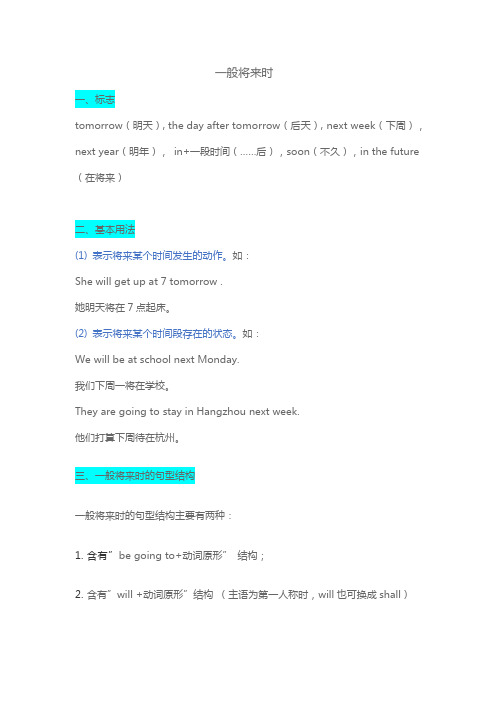
一般将来时一、标志tomorrow(明天), the day after tomorrow(后天), next week(下周),next year(明年),in+一段时间(……后),soon(不久),in the future (在将来)二、基本用法(1) 表示将来某个时间发生的动作。
如:She will get up at 7 tomorrow .她明天将在7点起床。
(2) 表示将来某个时间段存在的状态。
如:We will be at school next Monday.我们下周一将在学校。
They are going to stay in Hangzhou next week.他们打算下周待在杭州。
三、一般将来时的句型结构一般将来时的句型结构主要有两种:1.含有”be going to+动词原形”结构;2.含有”will +动词原形”结构(主语为第一人称时,will也可换成shall)(1)肯定句:She is going to buy some vegetables tomorrow morning . 她打算明天上午买一些蔬菜。
(2)否定句:在be动词后加not。
is和are可以和not缩写为isn't,aren't。
She isn’t going to buy any vegetables tomorrow morning . 她明天上午不去买蔬菜。
(3)一般疑问句及其答语:将be动词放在句子开头,且首字母要大写,句末用问号。
肯定回答:Yes,主语的相应代词+am/is/are.否定回答:No,主语的相应代词+am not /isn't/aren't.—Is she going to buy any vegetables tomorrow morning?她打算明天上午去买一些蔬菜吗?—Yes,she is./No,she isn't. 是的,她打算去。
- 1、下载文档前请自行甄别文档内容的完整性,平台不提供额外的编辑、内容补充、找答案等附加服务。
- 2、"仅部分预览"的文档,不可在线预览部分如存在完整性等问题,可反馈申请退款(可完整预览的文档不适用该条件!)。
- 3、如文档侵犯您的权益,请联系客服反馈,我们会尽快为您处理(人工客服工作时间:9:00-18:30)。
一般将来时主要构成形式一般将来时表示将来某个时间要发生的动作,事情或存在的状态,也表示将来经常或反复发生的动作或事情。
1)will/shall+动词原形shall用于第一人称,常被will 所代替。
will 在陈述句中用于各人称,在征求意见时常用于第二人称。
will not=won't shall not=shan't例如:Which paragraph shall I read first?我先读哪一段呢?Will you be at home at seven this evening? 今晚七点回家好吗?2)be going to +不定式,表示将来。
a. 主语的意图,即将做某事。
例如:What are you going to do tomor row? 明天打算作什么呢?b. 计划,安排要发生的事。
例如:The play is going to be produced next month。
这出戏下月开播。
c. 有迹象要发生的事。
例如:Look at the dark clouds, there is going to be a storm. 看那乌云,快要下雨了。
3)be +不定式表将来,按计划或正式安排将发生的事。
例如:We are to discuss the report next Saturday.我们下星期六讨论这份报告。
4)be about to +不定式,意为马上做某事。
例如:He is about to leave for Beijing. 他马上要去北京。
注意:be about to do 不能与tomorrow, next week 等表示明确将来时的时间状语连用。
Notice:be to和be going tobe to 表示客观安排或受人指示而做某事,be going to 表示主观的打算或计划。
例如:I am to play football tomorrow afternoon. 明天下午我去踢球。
(客观安排)I'm going to play football tomorrow afternoon. 明天下午我想去踢球。
(主观安排)5.现在进行时表将来时下列动词的现在进行时表示将来时e.fly.leave.start.begin.finish.end.arrive and so on.she is leaving for Wuhan tomorrow.6.一般现在时表将来1)下列动词come, go, arrive, leave, start, begin, return的一般现在时可以表示将来,主要用来表示在时间上已确定或安排好的事情。
例如:The train leaves at six tomorrow morning. 火车明天上午六点开。
When does the bus star? It stars in ten minutes. 汽车什么时候开?十分钟后。
2)以here, there等开始的倒装句,表示动作正在进行。
例如:Here comes the bus. = The bus is coming. 车来了。
There goes the bell. = The bell is ringing. 铃响了。
3)在时间或条件句中。
例如:When Bill comes (不是will come), ask him to wait for me. 比尔来后,让他等我。
I'll write to you as soon as I arrive there. 我到了那里,就写信给你。
4)在动词hope, take care that, make sure that等的宾语从句中。
例如:I hope they have a nice time next week. 我希望他们下星期玩得开心。
Make sure that the windows are closed before you leave the room. 离开房间前,务必把窗户关了。
be going to和will 的区别be going to和will 的用法虽然都表示将来发生动作或情况,一般情况下能互换。
但它们的用法是有区别的。
(1)be going to主要用于:1、表示事先经过考虑、安排好打算、计划要做的事情。
E.g.What are you going to do today? 今天你们打算做什么?Dad and I are going to watch an opera this afternoon. 今天下午我和爸爸打算去看歌剧。
I’m going to play the violin. 我打算拉小提琴。
She’s going to play the piano. 她打算弹钢琴。
2、表示根据目前某种迹象判断,某事非常有可能发生。
E.g.Look! There come the dark clouds. It is going to rain. 瞧!乌云密集,天要下雨。
I am afraid I am going to have a cold. 恐怕我要患重感冒。
(2) will主要用于在以下几个方面:1、表示单纯的未来“将要”通用各个人称。
eg:They will go to visit the factory tomorrow. 明天他们将去工厂参观。
I’ll come with Wang Bing, Liu Tao and Yang Ling. 我将和王兵、刘涛、杨玲一起来。
2、表示不以人的意志为转移的自然发展的未来的事。
eg:Today is Saturday. Tomorrow will be Sunday. 今天是星期六。
明天是(将)是星期日。
He will be thirty years old this time next year. 明年这个时候他就(将)三十岁。
3、问对方是否愿意做某事或表示客气地邀请或命令。
eg:Will you please turn on the radio? 请打开收音机好吗?Will you go to the zoo with me? 你和我一起去动物园好吗?一般将来是特殊用法:1) be +不定式表将来,按计划或正式安排将发生的事。
We are to talk about the report next Saturday.2)be about to +不定式,意为马上做某事。
He is about to leave for Beijing.注意:be about to 不能与tomorrow, next week 等表示明确将来时的时间状语连用。
3)有些表趋向性的动词可用想在进行时表将来:例如:go,come,arrive,fly(飞往),reach(到达),stay,leave,start, die...如:I’m going to go to the zoo this weenend.= I’m going to the zoo this weenend.He’s going to leave for Paris.= He’s leaving for Paris.The old man is dying.=The old man will die. 这个老人要去世。
练习题1. What time _____we meet at the gate tomorrow?A willB shallC doD are2. He will have a holiday as soon as he _____the work next week.A finishesB doesn’t finishC will finishD won’t finish3. There _____some showers this afternoon.A will beB will haveC is going to beD are going to have4. It ____my brother’s birthday tomorrow. She _____a party.A is going to be; will haveB will be; is havingC will be; is going to haveD will have; is going to be5. Li Ming is 10 years old now, next year he _____11.A isB is going to beC will beD will to be(二)、填空1. -“I need some paper.”- “I ____(bring)some for you.”2.____(be)you free tomorrow?3. They _________(not leave) until you come back.4. _____we_____(go) to the party together this afternoon?5. They want to know when the meeting _____start.6. I _____(go) with you if I have time.7. Hurry up! Or we ______(be) late.8.What ____you _______(do) tomorrow afternoon?9. Jenny ____ _____ (do) an experiment the day after tomorrow.10. If she isn’t free tomorrow, she _______(not take) part in the party.三、There be结构的一般将来时易出错例:There_________ a basketball match this afternoon. (B)A is going to beB is going to haveC are going to beD are going to have四、be going to结构中易丢掉to例:I’m going _______(go) school by bike tomorrow. (C)A to will goB to go toC go toD to goif条件句【知识要点】定义:常见的if条件状语从句表示在某条件下,某事很可能发生,条件是可能存在的,主句中某种情况发生的概率也是很高的。
E.g. If you ask him,he will help you.如果你请他帮忙,他会帮你的。
